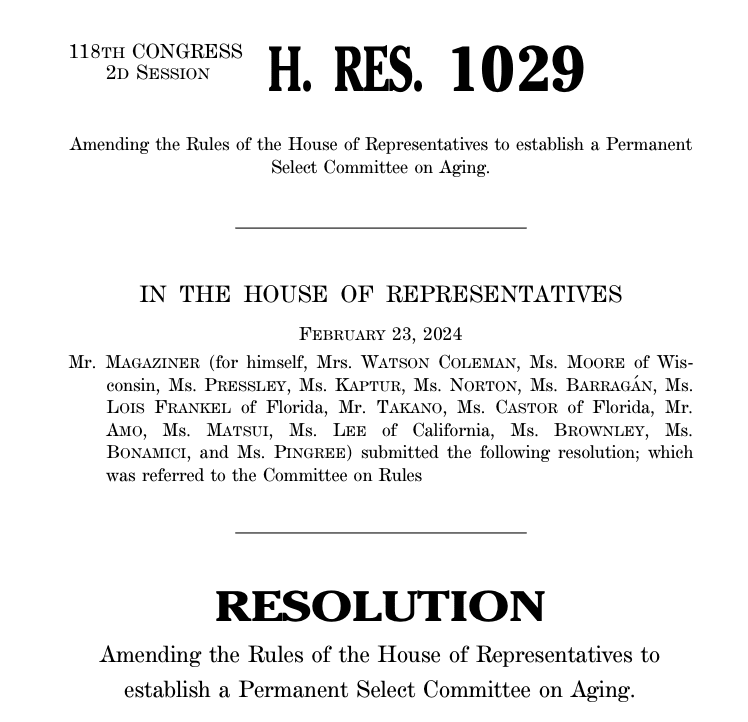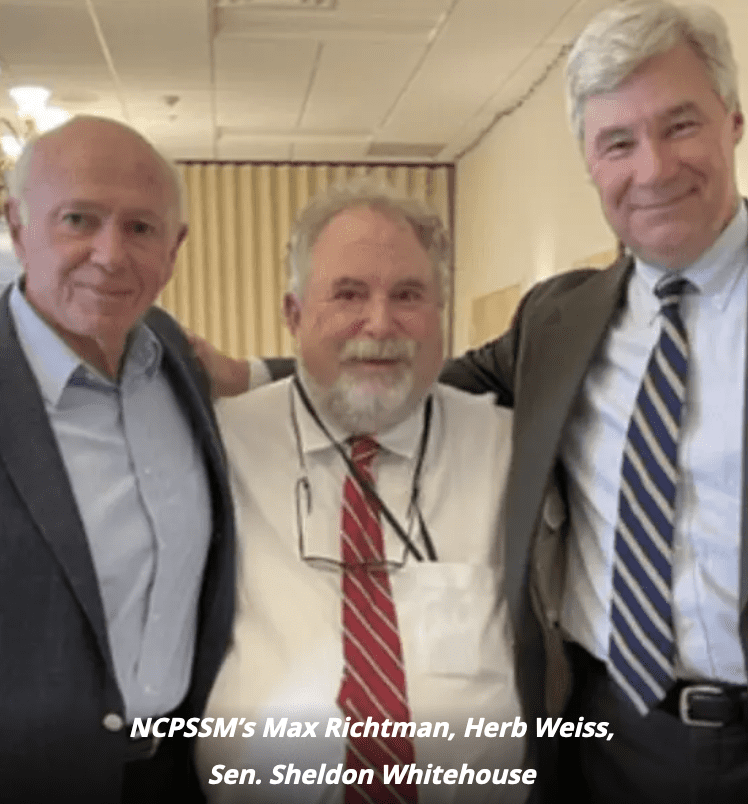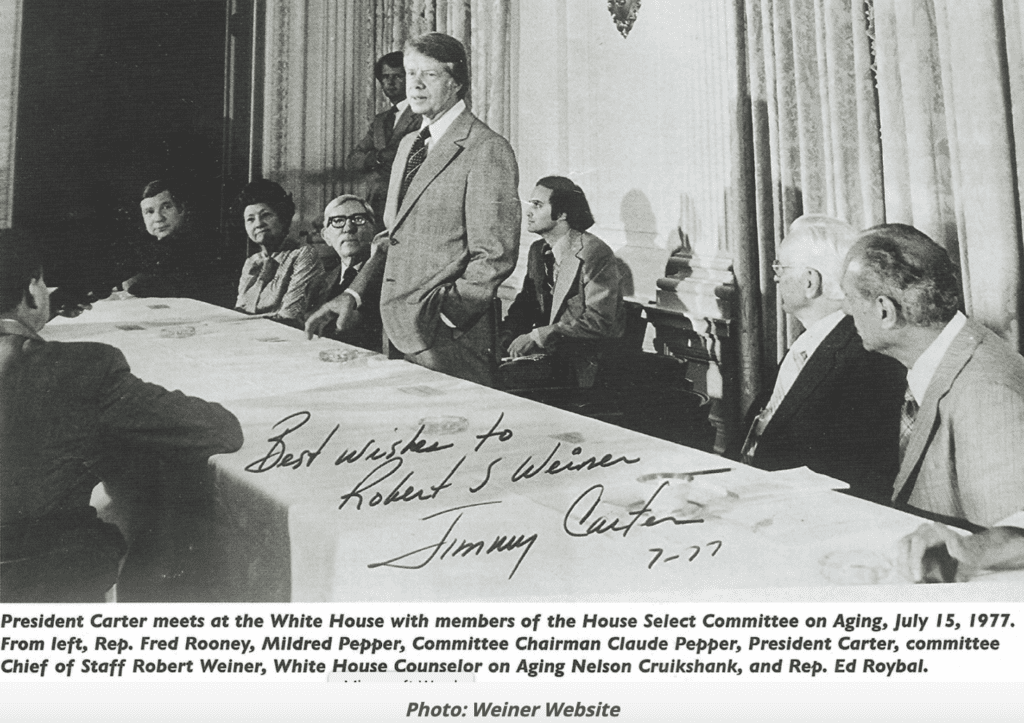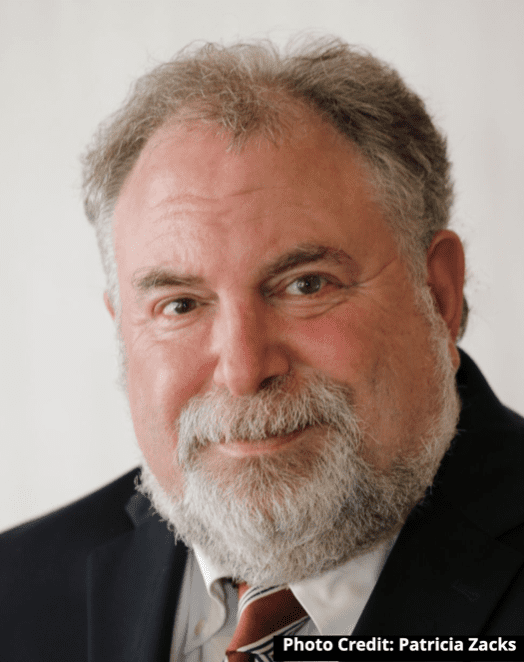Search Posts
Recent Posts
- U.S. Carries Out Limited Strike on Iran’s Known Nuclear Sites (Updates) June 22, 2025
- A Greener View: E. Coli vs. Vegetables, and Your Garden – Jeff Rugg June 22, 2025
- Rhode Island Weather for June 22, 2025 – Jack Donnelly June 22, 2025
- Ask Chef Walter: The Art and Science of Baking – Chef Walter Potenza June 22, 2025
- Gimme’ Shelter: Aurora is waiting for a home at the Providence Animal Control Center June 22, 2025
Categories
Subscribe!
Thanks for subscribing! Please check your email for further instructions.

Bipartisan support needed to re-establish House Aging Committee – Herb Weiss
By Herb Weiss, contributing writer on aging issues
It was almost like attending a 34th high school reunion. After over three decades, an on-line meeting on April 25th, would bring five former senior staffers of the House Select Committee on Aging (HSCoA) and House Rules Committee back together to provide firsthand accounts to Maia Leeds, legislative assistant for Josh Gottheimer (D-NJ), as to why the New Jersey Congressman, co-chair of the bipartisan House Problem Solvers Caucus, should call on the caucus to endorse H. Res. 1029, re-establishing the House Select Committee on Aging.
Washington, DC-based groups, including the National Committee to Preserve Social Security and Medicare (NCPSSM), Social Security Works and the Alliance for Retired Americans, including this writer, along with key staff of Congressman Seth Magaziner (D-RI), the primary sponsor of the resolution, participated in the discussion of how the Rhode Island Congressman could attract more cosponsors, especially House Republican lawmakers.
Throughout the half-hour meeting, Leeds and others stressed the importance of recruiting Republican lawmakers, calling for bipartisan support of H. Res. 1029. According to “Votes in Congress” published in the New York Times on Oct. 13, 1974, even with the Democrats controlling the House in 1974, the HSCoA was established by a huge bipartisan vote of 299 to 74. In 1993, House Democratic belt-tightening efforts to save $ 1.5 million funding the operations of HSCoA would force it to close its door.
The House Aging Committee was not charged with drafting legislation. Its mission was to conduct investigations and hold hearings to put the spotlight on aging issues that would ultimately lead standing committees with aging jurisdiction to craft legislation to address these issues.
From the 114th Congress, until he retired during the 117th Congress, in each Congressional session, former Congressman David Cicilline had introduced a resolution to bring back the HSCoA. The resolution failed to gain traction and get support from either House Republic Leader Paul Ryan or Democratic House Democratic Leader Nancy Pelosi. Magaziner would ultimately pick up the baton and introduce H. Res. 1029, on Feb. 23, 2024. This resolution was referred to the House Committee on Rules for mark-up, and if passed will be considered by the full House. At press time, there are only 26 Democratic cosponsors, with no Republican cosponsors.
Simply Put…
Magaziner’s 213-word resolution simply amends the Rules of the House to establish a HSCoA, without legislative jurisdiction, to conduct a continuing comprehensive study and review an array of aging issues, including income maintenance, poverty, housing, health (including medical research), welfare, employment, education, and long-term care.
H. Res. 1029 also calls for the reestablished HSCoA to study ways that would encourage the development of public and private sector programs and policies that would keep older Americans active in their community.
The resolution would also allow the HSCoA to develop policies that would encourage the coordination of both government and private programs designed to deal with problems of aging -and to review any recommendations made by the President or White House Conference on Aging in relations to programs and policies impacting seniors.
According to EveryCRS Report, the House can easily establish an ad hoc (temporary) select committee just by approving a simple resolution with no Senate or Presidential approval. It contains language establishing the committee, detailing a purpose, defining membership. Salaries and expenses of standing committees, special and select, are authorized through the Legislative Branch Appropriations bill.
Magaziner, currently out on parental leave, couldn’t make the online meeting, but Chief of Staff Clayton Schroers, and Kyra Whitelaw, Legislative Assistant, came to monitor the gathering to gain insight from former staffers of HSCoA’s impact on the development of aging policy.
According to Magaziner, his staff are working hard to speak to other congressional offices about the benefits of the proposed committee and who will continue to work to raise the profile of this resolution to encourage other members to become cosponsors. “I was grateful for the opportunity to present to the Leadership Council on Aging, a national coalition of national nonprofit organizations that works on policy issues related to the well-being of America’s seniors,” says Magaziner, noting that his resolution has the support of the National Committee to Preserve Social Security and Medicare (NCPSSM) and Meals on Wheels America.”
As Magaziner works to increase the number of cosponsors for H. Res. 1029, he says: “The support of advocates is important to encouraging Congressional representatives to cosponsor this resolution.”
“I’m ready to work with anyone, from either party, to deliver results for Rhode Island—and that includes finding common ground on important legislation like H. Res. 1029,” says Magaziner. “I believe there’s still room for bipartisanship, and ensuring we address issues for seniors across the country should be an area where we can all agree. I will continue to urge my Republican colleagues to work together with Democrats to move our country forward,” he says.
Former Congressional staffers call for passage of H. Res. 1029

“A House Aging Committee would centralize Congress’s consideration of older American issues and could be of assistance to authorizing committees with legislative jurisdiction over agencies and programs important to seniors,” says Max Richtman, NCPSSM’s President and CEO, explaining why NCPSSM will directly encourage House members to cosponsor H. Res. 1029.
According to Richtman, a 16-year veteran of Capitol Hill, the pros outweigh the cons on supporting Magaziner’s resolution. A House Aging Committee would centralize Congress’s consideration of older American issues and could be of assistance to authorizing committees with legislative jurisdiction over agencies and programs important to seniors. However, it would take staff and clerk hire (money) away from the authorizing committees.
Like Magaziner, Richtman observes that bipartisan support for programs and agencies important to senior has a mixed record. “There is some bipartisan agreement on the Older Americans Act (OAA). But even on OAA, bipartisan action can vary widely, says Richtman, especially when Republicans want to make across the board cuts to non-defense discretionary spending, including OAA, Supplemental Nutrition Assistance Program and Low-Income Home Energy Assistance Program. “And there appears to be no bipartisan agreement on Social Security, Medicare and Medicaid,” he says.
Richtman, a former Staff Director of the Senate Special Committee on Aging, says that the upper chamber sees the value of the Senate Aging Committee, noting that he believes that it has operated in a bipartisan manner.
Bob Blancato, former Executive Director of the 1995 White House Conference on Aging and former Staff Director, Subcommittee on Housing & Consumer Interests, from 1978-93, has joined the efforts to pass H. Res. 1029. “I just wanted to add another voice in favor of this resolution,” says Blancato, President of Matz, Blancato and Associates.
According to Blancato, who served as Staff Director of the Subcommittee on Human Services from 1977 to 1991, important policies were addressed over those years. Several amendments to the Older Americans Act were adopting, including creating a separate program for home delivered meals. He remembers his subcommittee held the first hearing ever on the issue of grandparent visitation rights.
Although some standing committee chairs felt THE aging committee made them work harder because of issues raised in their legislative jurisdictions, there were many examples of both “working together,” says Blancato. He recalls the House Education and Labor Committee working close with his subcommittee on legislation, including the Older Americans Act and the Age Discrimination in Employment Act.
Blancato sees the need to bringing back the HSCoA. Since it was abolished over 30 years ago, there are many issues that need to be addressed with the graying of the nation’s population, he says.
“A good gauge to see if House lawmakers consider aging policy to be a bipartisan issue is if the Older Americans Act gets renewed on a bipartisan vote this year,” notes Blancato, stressing that “this will be a good test.”
Elaina K. Goldstein, JD, MPA remembers the day when the HSCoA ceased to exist. “It was heartbreaking to have to pack up the incredible work done by the HSCoA and I am thrilled to be involved with its resurrection,” says the former Legal Counsel for the Subcommittee on Retirement and Employment. “It would be incredible if H. Res. 1029 passes, to once again see its staff work hand in hand with the Committees of jurisdiction to get important issues into the light so they could be remedied to make life better for seniors,” she says.
As a former HSCoA staffer, Goldstein disagrees with those seeing conflict between the Select Committee and Standing Committees. “Quite the opposite,” she said, noting that Subcommittees did not have and will not have any legislative jurisdiction.,” she noted.
According to Goldstein, many of the Employee Retirement Income Security Act of 1974 (ERISA) health concerns and subsequent hearings held by HSCoA were uncovered by the Senate Finance Committee staff who felt they could not move forward politically in their Committee but felt the House Aging Committee could get the issue out in the open and then they could follow up. “As I said, these issues were ultimately addressed in the passage of the Health Insurance Portability and accountability Act of 1996,” she noted.
As to gaining Republican cosponsors, Goldstein sees aging policy losing some of its bi-partisan appeal with the debates over Social Security and Medicare. “It seems that Republican lawmakers feel the issues of Social Security and Medicare are Democratic issues,” she says, noting that there are so many others. “If the Committee would also take on the issues and concerns of people with disabilities —which they do in the Senate Aging committee —many issues that impact the aging are issues for the disabled as well,” she says, stressing this could well increase bi-partisan appeal.
Robert Weiner, President of Robert Weiner Associates News, saw the negative impact of the HSCoA being abolished. As Staff Director of the Health and Long-Term Care Subcommittee from 1975-76 and the former Claude Pepper’s (D=FL) Chief of Staff (1976-80) when he chaired the full committee, Weiner knew how shortchanged seniors would be when the committee was abolished. “I always have wanted that decision reconsidered.,” he said.
“Reform”, instead of facts on Social Security have unfortunately now become the political value system norm, and age discrimination has crept back more and more, from hiring and firing in everything whether private sector or politics. The Aging Committee and its members were and could again be a wedge of power representing older Americans of both parties,” says Weiner, who was a close confident of Pepper until he died in 1989.
Looking back, “We got legislation passed abolishing age-based mandatory retirement, as well as Medicare expansion of home health care, standards for cancer insurance, a major Social Security protection deal co-authored by Pepper, and many other laws by initial press during our investigations and then working closely with the standing committees on the bills,” says Weiner.
Some say that Cicilline’s efforts to pass the resolution to reestablish the HSCoA stalled because of the standing committee’s fear of loss of power in the legislative process. “This is anything but new. We did, and any new committee must, cooperate with, meet with, and support the standing committees’ efforts. Pepper always made friends and cooperated. We worked closely with chairs and leaders from Gus Hawkins (D-CA) to Gladys Spellman (D-MD) to Dan Rostenkoswski (D-Ill) to House Speaker Tip O’Neill (D-Mass) and Republican leader Bob Michel (R-Ill),” remembered Weiner.
The key to getting Magaziner’s resolution passed is for the Congressman to actively work to expand the co-sponsorships by taking co-sponsorship sign-up sheets and have conversations around the House floor and cloakrooms and thereby get to well over 100,” says Weiner.
A Final Note:

At the on-line meeting, former Senior Staff of HSCoA and Washington, DC-based aging groups, and Rhode Island senior advocates, praised Congressman Josh Gottheimer’s co-sponsorship of H. Res. 1029. Increasing the number of co-sponsors to over 100, especially recruiting GOP lawmakers, might just give the resolution traction this Congress. Hopefully, Congressman Brian K. Fitzpatrick (R-PA) and the moderate Democratic and Republican members of his caucus will see the value of following Gottheimer’s lead. Yes, aging should be considered a bipartisan issue, just like it was in 1974 when both Democrats and Republicans rallied to establish HSCoA.
Without support of the House Republican leadership, Richtman warns that it is unlikely that H. Res. 1029 will be considered during the 118th Congress. However, efforts to drive up the number of cosponsors – especially if it can attract some Republican support – might enable the resolution to be considered if there is a more pro-senior majority in the House of Representatives,” he says.
It’s now time for House Speaker Mike Johnson (R-LA) to step to the plate and support H. Res. 1029, and consider aging to be a bipartisan issue. The switching of legislative control in the Senate over 47 years and the contentious debates over Social Security and Medicare, has had little impact on the operations of the Senate Special Committee on Aging. The bipartisan panel has continued to investigate and put the spotlight on critical aging issues, working with Senate standing committees to draft legislation to enhance the life and well-being of America’s seniors. It’s now time for the House to bring back the HSCoA.

Participants of April 25 online meeting:
House Staffers: Chief of Staff Clayton Schroers and Kyra Whitelaw, Legislative Assistant, Office of Congressman Seth Magaziner; Maia Leeds, legislative Assistant, for Josh Gottheimer, Office of Congressman Josh Gottheimer.
Senior House Staffers: Bill Benson, former Assistant Secretary for Aging, US Dept. of Health and Human Services and former Staff Director of the Subcommittee on Housing & Consumer Interests, House Permanent Select Committee on Aging, from 1987-90; Bob Blancato, former Executive Director of the 1995 White House Conference on Aging and former Staff Director, Subcommittee on Housing & Consumer Interests, from 1978-93; Elaina K. Goldstein, JD, MPA, former Legal Counsel for the Subcommittee on Retirement Income and Employment; Robert S. Weiner, former Staff Director, Subcommittee on Health and Long-Term Care from 1975-77, Chief of Staff of the full Aging Committee from 1976-80); Thomas J. Spulak, formerStaff Director, House Rules Committee (under Congressman Pepper), 1982-89 and Chair, the Claude Pepper Foundation;
National Aging Organizations: Nancy Altman, President, Social Security Works, Dan Adcock, Government Relations and Policy Director of the NCPSSM; and David Simon, Legislative Representative for the Alliance for Retired Americans.
Rhode Island: Vincent Marzullo, former Director of the Corporation for National Community Service, Board member of the Senior Agenda of RI, and member of Magaziner’s Senior Advisory Council; Robert Robillard, President of RI Senior Center Directors Association; and writer Herb Weiss.
Other article in RINewsToday on the House Committee on Aging:
More articles, here: https://rinewstoday.com/page/3/?s=committee+on+aging
___

Herb Weiss, LRI -12, is a Pawtucket-based writer who has covered aging, health care and medical issues for over 43 years. To purchase his books, Taking Charge: Collected Stories on Aging Boldly and a sequel, compiling weekly published articles, go to herbweiss.com.

This following email from Fernando Torres-Gil, M.S.W., Ph.D., Professor, Social Welfare and Public Policy, Director, Center for Policy Research on Aging, UCLA Luskin School of Public Affairs, was sent to me after this article was published.
“To All: So sorry to not be able to access the recent call BUT DO KNOW that I fully support efforts to bring back the House Aging Committee and I’m grateful that Congressmember Magaziner is leading the charge. As former Staff Director (under Congressman Edward R. Roybal) from l985-l987, I took great pride in our accomplishments including preparing legislative for nursing home reforms and ending mandatory retirement. We worked in a clear bi-partisan manner with full support from Democratic and Republican members and staffers. My hope is that a renewed House Aging Committee can among it broad mission, also be a focus point for renewed bipartisan effort in the House and Congress. Fernando M. Torres-Gil
Addendum: I later served as the first U.S. Assistant Secretary on Aging in the Clinton Administration. Two years into our first term, the Congress shifted to Republican control and for a time, I was the key person in DHHS to have communication with key Republican committee leaders; in part, as several told me, because they remembered in my time with the House Aging Committee and how we respected the minority (Republicans). The newly installed Republican majority appreciated the bi-partisan respect we showed to all.
Thanks for keeping us in the loop.
Although a resolution doesn’t have the force of law, it is a first step.